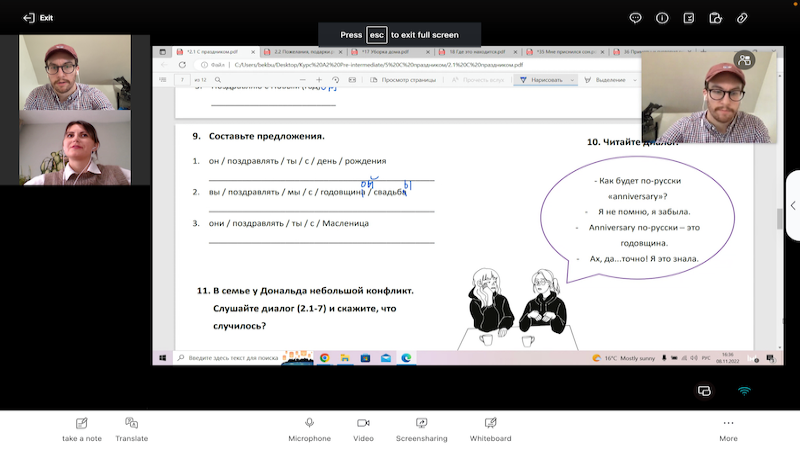
Learning Russian Remotely
By Collin Husted, MALD 2023 Candidate, The Fletcher School
I knew before I even started my Masters of Law and Diplomacy at The Fletcher School that I wanted to learn Russian to complement my focus on the region, and better understand its culture and history. I had little academic experience studying Russia and knew it would be a steep learning curve, but wanted to take advantage of the range of opportunities at the Fletcher School. Thanks to the generosity of the Russia and Eurasia Program, I have had the opportunity to take Russian lessons online from a native instructor from Krasnoyarsk, Siberia. The experience has been extremely helpful in advancing my Russian speaking and listening comprehension, and has allowed me to learn more about the country’s norms and culture.
After I audited both of the elementary Russian classes at Tufts during my first and second semesters, I knew that I wanted to continue my language studies over the summer. During my research, I stumbled across a website called italki.com that connects language learners with teachers from a range of languages, including Russian. The instructors vary in qualification from native speakers to certified language instructors, each with reviews from students, video introductions, and sample lesson plans. Lessons can be purchased individually or in blocks, which usually have a discount. The price per hour ranges from $13 to $20 and is set by the instructor.
The On the platform, the initial 30-minute lesson with the instructor is an overview of the student’s language goals, an assessment of their current level of speaking ability, and an outline of what the course would look like if they proceed with that instructor. The first instructor I booked lessons with was the wife of former Russian diplomat Boris Bondarev, who wrote an open letter criticizing the Ministry of Foreign Affairs for becoming a political tool of the Kremlin. He was recalled to Moscow and she had to discontinue her teaching after only a couple lessons. The second instructor, Kristina, who I’m still studying with, left Russia in mid-2022 and has since been living in Turkey. I was able to hear first hand about her experience and the changes she witnessed in her new home as more Russians left to settle abroad.
It’s clear throughout my time with Kristina that my Russian language ability has increased markedly, and I recently completed my 80th lesson. Throughout the entire process, I have been consistently impressed with the level of preparedness my instructor has shown. She has a full slideshow presentation for each lesson consisting of new words and phrases, grammar, conversation practice, cultural elements, and homework. Every few lessons, she tests my progress, drawing on material from previous lessons. She also sets aside time to chat informally, which has been very helpful in learning more colloquial Russian beyond what’s in textbooks. This also allows us to discuss Russian music, movies, shows, books, and news, all of which expands vocabulary and has given me some recommendations for practicing my reading and listening comprehension with real-world material. Поле Чудес, for example, has full episodes on YouTube and is a Russian game show institution which provides an insightful and enjoyable cultural element. Having this personalized one-on-one instruction has been invaluable in learning the language.
I plan to continue taking lessons with Kristina through the end of my time at Fletcher and afterward. The difference between one-on-one instruction and a traditional classroom environment is like night and day. I would highly recommend that everyone trying to learn a second language try, if financially possible, to check out italki. Most of my lessons are now conducted in Russian, and I can discuss a range of topics. Being the only student places a greater amount of pressure to learn the material, but also provides a more personalized experienced that moves at my pace. I never would have been able to start taking lessons on italki without the funding provided by the Russia and Eurasia Program, and I am extremely grateful to them for the opportunity.
